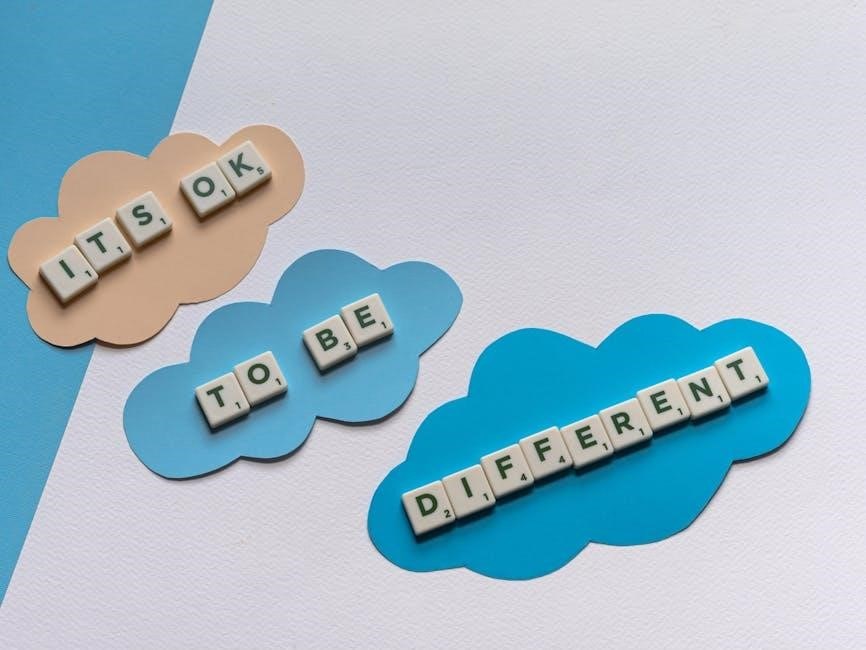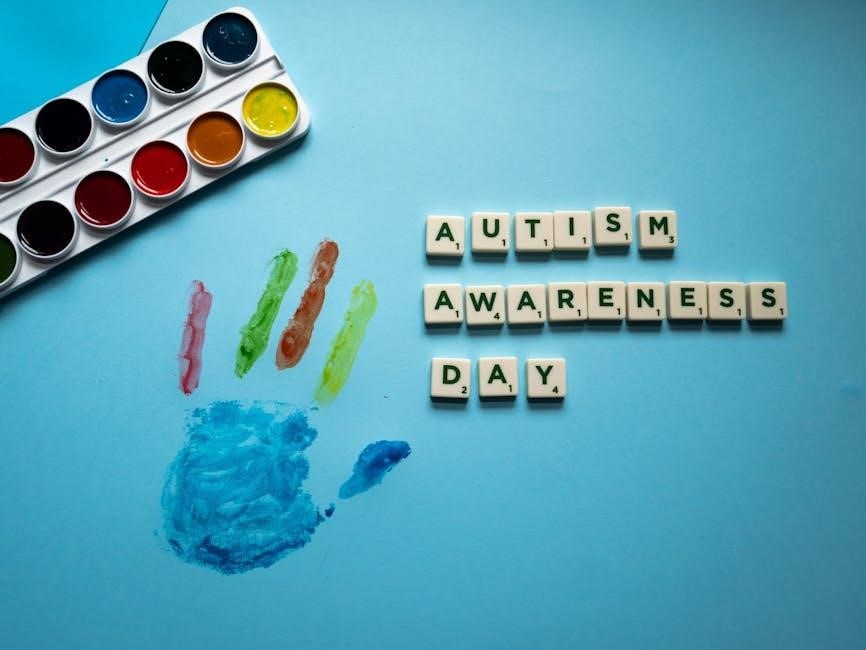
unmasking autism pdf
Unmasking Autism by Devon Price, PhD, offers a profound exploration of neurodiversity, focusing on masked autism and self-acceptance. The accompanying PDF workbook provides practical tools for self-discovery and empowerment, enabling individuals to embrace their authentic selves without shame or judgment, fostering personal growth and societal understanding.
1.1 Overview of the Book and Its Significance
Unmasking Autism by Devon Price, PhD, is a groundbreaking book that delves into the complexities of neurodiversity, particularly focusing on masked autism. It challenges stereotypes and offers a roadmap for autistic individuals to embrace their true selves. The book’s significance lies in its ability to provide both personal and societal insights, encouraging radical self-acceptance and understanding. Accompanied by a PDF workbook, it equips readers with practical tools for self-discovery, making it an essential resource for personal growth and fostering a more inclusive society.

1.2 The Concept of Masked Autism and Neurodiversity
Masked autism refers to the way autistic individuals often hide their true selves to conform to societal expectations, suppressing their natural behaviors. This concept, explored in Unmasking Autism, highlights the emotional toll of masking and the importance of embracing neurodiversity. The book emphasizes radical self-acceptance, encouraging individuals to reclaim their authentic selves. By addressing stereotypes and misconceptions, it fosters a deeper understanding of autism, promoting acceptance and inclusivity. The accompanying PDF workbook offers practical tools to aid in this journey of unmasking and self-discovery.
1.3 The Role of the PDF Workbook in Self-Discovery
The PDF workbook accompanying Unmasking Autism serves as a vital tool for self-discovery, offering structured exercises and reflections. It guides individuals in identifying and understanding their autistic traits, helping them shed societal masks. With practical prompts and activities, the workbook supports personal growth, fostering self-awareness and acceptance. Its digital format ensures accessibility, making it an essential resource for those navigating neurodiversity and seeking to embrace their authentic selves.

Understanding Masked Autism
Masked autism refers to autistic individuals concealing their traits to fit societal norms. This behavior, driven by expectations, can hinder self-acceptance and true understanding of neurodiversity.
2.1 What is Masked Autism and How Does it Manifest?
Masked autism occurs when autistic individuals conceal their traits to meet societal expectations. This can manifest as social challenges, sensory sensitivities, and difficulties with communication. Many autistic people develop coping strategies, such as camouflaging, to hide their differences. This often leads to emotional exhaustion and mental health struggles. Masking can prevent accurate diagnoses and hinder self-acceptance, making it crucial to recognize and address these behaviors in fostering understanding and support for neurodiverse individuals.
2.2 The Psychological and Emotional Impact of Masking
Masking autism can lead to significant psychological and emotional challenges, including anxiety, depression, and burnout. The constant effort to hide autistic traits creates mental exhaustion and feelings of inauthenticity. Many individuals struggle with self-esteem, fearing judgment or rejection if their true selves are revealed. This emotional burden can hinder personal growth and relationships, emphasizing the need for radical self-acceptance and understanding. Recognizing these impacts is crucial for supporting autistic individuals in embracing their neurodiversity and finding emotional liberation.
2.3 Societal Pressures and Expectations That Lead to Masking
Societal pressures to conform to neurotypical norms often force autistic individuals to mask their true selves. Expectations around social behavior, communication, and emotional expression create a need to hide autistic traits. These pressures stem from misconceptions and stigma surrounding autism, leading many to feel they must “fit in” to avoid judgment or rejection. The strain of meeting these expectations can result in emotional distress and burnout. Understanding these societal influences is key to fostering acceptance and reducing the need for masking, allowing autistic individuals to embrace their authentic selves.

The PDF Workbook: A Tool for Self-Discovery
The PDF workbook accompanying Unmasking Autism offers practical exercises and tools to help individuals embrace their neurodiversity and reclaim their authentic selves through guided self-reflection and empowerment.
3.1 Structure and Content of the Workbook
The workbook is structured to guide individuals through self-discovery, with sections on understanding masked autism, practical exercises for unmasking, and strategies for radical self-acceptance. It includes reflective prompts, real-life examples, and actionable steps to support personal growth and empowerment, making it an essential companion for those navigating neurodiversity and seeking to embrace their authentic selves. The content is designed to be accessible and engaging, ensuring a transformative journey toward self-awareness and acceptance.
3.2 Practical Exercises for Unmasking and Self-Acceptance
The workbook offers tailored exercises to help individuals identify and shed societal masks, fostering authenticity. Activities include journaling, mindfulness practices, and identifying triggers that lead to masking. These exercises empower users to reclaim their autistic identity, embrace neurodiversity, and cultivate self-compassion. By addressing internalized stigma and societal pressures, the workbook provides a safe space for exploration and growth, enabling individuals to live more authentically and confidently;
3.3 How the Workbook Supports Autistic Individuals
The workbook serves as a vital resource for autistic individuals, offering tools to enhance self-awareness and emotional well-being. It provides structured exercises to explore and accept one’s neurodiverse identity, helping users break free from societal expectations. The practical activities encourage personal reflection, identifying strengths, and addressing challenges. By fostering radical self-acceptance, the workbook empowers individuals to embrace their autism without shame, promoting mental health and resilience. Its accessible format ensures users can engage with the content at their own pace, making it an invaluable companion on their journey of self-discovery and growth.

Key Themes in “Unmasking Autism”
Unmasking Autism explores radical self-acceptance, breaking autism stereotypes, and the importance of community support. It emphasizes embracing neurodiversity and fostering understanding to promote inclusivity and acceptance.
4.1 Radical Self-Acceptance and Embracing Neurodiversity
Unmasking Autism champions radical self-acceptance, urging individuals to embrace their neurodiverse traits without shame. By promoting acceptance, the book empowers autistic people to relinquish societal expectations and foster authenticity. Devon Price highlights how self-acceptance is a powerful tool for personal liberation and societal change.
4.2 Breaking Down Stereotypes and Misconceptions About Autism
Unmasking Autism actively challenges common stereotypes surrounding autism, revealing the diversity of experiences within the neurodiverse community. By addressing misconceptions, the book encourages a broader understanding of autism, emphasizing that it is not a deficit but a natural part of human diversity. This section debunks myths, promoting acceptance and reducing stigma.
4.3 The Importance of Community and Support Systems
Building a supportive community is vital for autistic individuals to thrive. Unmasking Autism emphasizes the role of understanding peers and allies in fostering acceptance. The PDF workbook complements this by offering exercises that encourage connection and mutual support. By creating safe spaces for sharing experiences, individuals can embrace their neurodiversity without fear of judgment. This collective empowerment not only aids personal growth but also challenges societal norms, promoting a culture of inclusion and acceptance.

The Role of the PDF in Modern Discussions on Autism
The PDF workbook complements Unmasking Autism by providing accessible, digital tools for self-discovery and acceptance, enhancing modern discussions on autism with practical, shareable resources.
5.1 How the Workbook Complements the Book’s Message
The PDF workbook serves as a powerful companion to Unmasking Autism, offering practical exercises and tools that help individuals apply the book’s principles of radical self-acceptance and neurodiversity. By providing actionable steps for self-discovery, the workbook enables readers to unpack their experiences with masked autism, fostering personal growth and empowerment. Its structured format aligns seamlessly with the book’s themes, creating a holistic resource for understanding and embracing autistic identities. This integration of theory and practice makes the workbook an indispensable tool for those on a journey of unmasking and self-acceptance.
5.2 Digital Accessibility and the Impact of the PDF Format
The PDF workbook enhances accessibility, ensuring broader reach and inclusivity for neurodivergent individuals. Its digital format allows for easy sharing, downloading, and compatibility across devices. The PDF’s searchability and adjustable text size cater to diverse needs, making it particularly beneficial for those who may struggle with physical copies. This format aligns with the growing preference for digital resources, offering convenience and flexibility. By providing a readily accessible tool, the PDF workbook supports the book’s mission of empowering autistic individuals and fostering understanding in the digital age.
5.3 The Growing Popularity of Digital Resources for Neurodivergent Individuals
Digital resources like the Unmasking Autism PDF workbook are increasingly sought after by neurodivergent individuals. The convenience of digital formats allows for easy access, privacy, and personalization. Many users appreciate the ability to use these tools at their own pace, enhancing their self-discovery journey. The rise of e-books and workbooks reflects a shift toward accommodating diverse learning styles and needs. This trend underscores the importance of accessible, flexible resources in supporting autistic individuals and promoting neurodiversity understanding in modern society.

Challenges and Considerations
The Unmasking Autism PDF faces challenges like accessibility barriers and potential misuse of sensitive content. Ethical sharing and proper guidance are essential to ensure its effective use and protect users’ privacy, balancing convenience with responsibility for neurodivergent individuals seeking self-discovery tools.
6.1 Potential Challenges in Using the Workbook
Using the Unmasking Autism PDF workbook may present challenges, such as accessibility issues for visually impaired individuals or those without reliable technology. Some users may struggle with the emotional intensity of self-reflection exercises, potentially leading to overwhelm. Additionally, without proper guidance, the workbook’s tools might be misinterpreted, causing confusion or misinformation. Balancing personal autonomy with structured support is crucial for maximizing its benefits while minimizing potential setbacks for neurodivergent individuals navigating their authentic selves.
6.2 Ethical Considerations in Sharing and Using the PDF
Sharing and using the Unmasking Autism PDF requires ethical consideration to ensure proper use and distribution. Respecting copyright and intellectual property rights is essential, as unauthorized sharing may infringe on the author’s work. Additionally, ensuring accessibility for all users, including those with disabilities, is crucial. Proper attribution and avoiding misuse of the content are important to maintain its integrity. Ethical guidelines should be followed to promote responsible sharing and utilization of the workbook, balancing accessibility with respect for the creator’s rights and intentions.
6.3 Addressing Misinformation About Autism in Online Resources
Combatting misinformation about autism is crucial, especially with the rise of online resources. The Unmasking Autism PDF serves as a reliable tool, offering accurate insights and practical exercises to help individuals understand autism better. By providing evidence-based information, it counters myths and stereotypes, promoting a more informed and empathetic society. This resource is invaluable for those seeking to educate themselves and support autistic individuals effectively.
Unmasking Autism and its PDF workbook offer transformative insights, empowering individuals to embrace neurodiversity and fostering societal change. Continuing education and open conversations are essential for progress, ensuring autistic voices are heard and valued in creating a more inclusive world.
7.1 The Broader Impact of “Unmasking Autism” on Society
Unmasking Autism challenges stereotypes and fosters understanding of neurodiversity, encouraging societal acceptance. The book and its PDF workbook empower individuals to embrace their autism, promoting inclusivity and reducing stigma. By providing practical tools for self-discovery, it not only supports autistic individuals but also educates neurotypical audiences, creating a ripple effect of awareness and empathy. This shift in perception contributes to a more inclusive society, where diversity is celebrated and everyone can thrive authentically.
7.2 Encouraging Further Exploration and Education
Unmasking Autism inspires readers to delve deeper into autism understanding, offering resources like its PDF workbook for practical self-discovery. By encouraging education and exploration, the book fosters a culture of learning, helping individuals and society embrace neurodiversity. The workbook’s exercises and insights empower autistic individuals to explore their identity while educating others about autism’s complexities. This collective effort promotes a more informed and compassionate world, where continuous learning and acceptance are prioritized for all.
7.3 The Importance of Continuing the Conversation on Neurodiversity
Unmasking Autism emphasizes the need for ongoing dialogue about neurodiversity, ensuring that autistic voices are heard. The PDF workbook complements this by offering tools for self-reflection, enabling individuals to share their experiences. This continued conversation fosters understanding and acceptance, breaking down stereotypes and promoting inclusivity. By encouraging open discussions, the book and workbook help create a society where neurodiversity is celebrated, and autistic individuals can thrive authentically. The collective effort to keep the conversation alive is crucial for lasting change and empowerment.